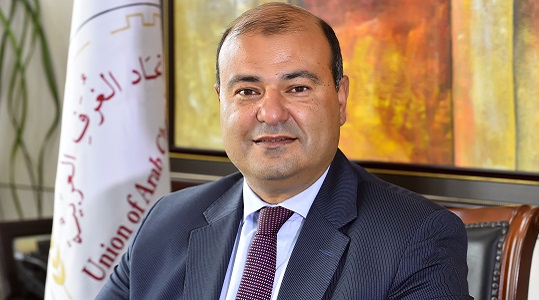Secretary General of the Union of Arab Chambers, Dr. Khaled Hanafi, indicated that “the Union of Arab Chambers is adopting a project aimed at facilitating the free movement of individuals and capital between Arab countries, thus contributing to the recovery of intra-regional trade between countries of the region.”
The Secretary-General of the Union, in an interview with Al Arabiya Business, revealed that “the Union of Arab Chambers spoke with the Council of Arab Interior Ministers and the Secretary-General of the League of Arab States to adopt a proposal to prepare a “white list”, that aims to facilitate the movement of Arab businessmen within the entire Arab region without restrictions through a unified visa.”
Dr. Khaled Hanafi explained that the white list allows the movement of Arab businessmen from any Arab country to another for a period of 5 years, without the need to carry out the procedures related to obtaining an entry visa, security examination, etc., upon entering each time. Considering that “the white list, which will be approved by the Union of Arab Chambers and the competent authorities in each country, aims to increase joint Arab investments and enhance intra-Arab trade between Arab countries,” pointing out that “the issue of facilitating the movement of Arab investors is currently witnessing implementation steps being taken regarding it, and accordingly, the Arab Gulf countries, for example, have adopted a unified visa. Egypt also began allowing some categories of European visa holders to enter the country without a special visa for Egypt. Saudi Arabia also began allowing this. “There has begun to be development in this matter, and this encourages businessmen to move freely.”
At the end of last September, the Board of Directors of the Union of Arab Chambers launched the “Bahrain Declaration for the Arab Private Sector,” which recommended redoubling efforts to achieve Arab economic and social integration, as it is an essential pillar for advancing joint Arab economic and social work and integration, and for achieving economic and social development for Arab countries.
The declaration also recommended working to achieve the four freedoms that enhance Arab economic integration, which are the freedom of movement of individuals: by granting multiple long-term visas to businessmen through Arab chambers, the freedom of movement of capital and ease of transfers, and the freedom of movement of goods by removing non-tariff obstacles, unifying specifications and standards, and unifying Registration procedures, in addition to the free movement of services by accelerating the approval of the Trade and Services Liberalization Agreement.
Hanafi said that the Union of Arab Chambers is working with a number of Arab countries that are suffering from a foreign exchange crisis and facing difficulties in capital transfers, on some solutions, to facilitate the flow of transfers to and from Arab countries.
Arab-Chinese Strategic Alliance
On the other hand, the Secretary-General of the Union of Arab Chambers said that the Union is working to transform the Arab-Chinese relationship from a commercial relationship only to a strategic alliance in production, industry, and trade.
He said: “We spoke with China about this matter... They are now dealing with us according to the concept of the strategic alliance that we currently need... We are seeking in the Arab region to enter strongly into the Chinese Belt and Road Initiative, which aims to enhance trade with Asia, Africa, and Europe, by establishing focal points for it in the Arab region.”
He pointed out that "China and the Arab countries enjoy a long history of economic cooperation, with bilateral trade reaching more than $330 billion in 2022, and it is expected to increase by 10 percent during 2024."
Source (Union of Arab Chambers)

